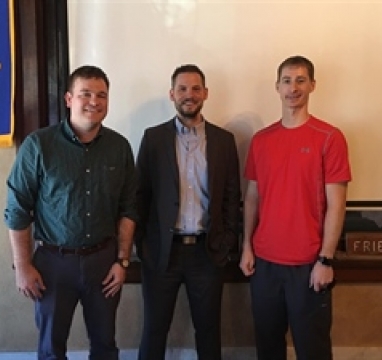Holdrege Rotarians learned about the importance of antibiotic stewardship and how antibiotics effect us both positively and negatively. Zach Egger, DO, told the Rotary Club that antibiotic use is a big topic with the medical providers and misuse and overuse can lead to further trouble down the road. Misuse or overuse of antibiotics can be dangerous, but by being good stewards and not prescribing unnecessarily or too quickly can actually improve patient outcomes, reduce microbial resistance, and decrease the spread of infections caused by multidrug-resistant organisms.
Dr. Egger noted that nationwide around 30% of antibiotics given are unnecessary and this number could be closer to 50% if considering medication choice, duration, and delivery route of medication. He stated that antibiotics lead to 1 in 5 emergency room visits and are the most common cause of pediatric emergency room visits due to an adverse drug event.
“They are a major threat to our public health. They will treat the bacteria that are sensitive, but that may also include good bacteria that are not causing the problem, said Dr. Egger.” He added, “You are treating something that’s not actually causing the problem. If you are killing good bacteria you are letting the bad stuff grow and multiply.”
Antibiotics are drugs that treat bacterial infections. They are often used to treat strep throat, UTIs, and other infections. Though many people think they help with colds, the flu, and sore throat caused by viruses, they do not treat these illnesses. Antibiotic resistance occurs when the bacteria have adapted to certain antibiotics, making the drugs less effective. Bacteria develop the ability over time to mutate and defeat or resist the medicines designed to kill them.
“Once easily treated conditions can become much more difficult to treat,” stated Dr. Egger. This leads to longer disease courses are more people have to return to medical clinics and hospitals.
Dr. Egger discussed the difference between viral and bacterial infection. He stated that medical providers can do “delayed or watchful waiting antibiotics.” For example, parents of an ill child can call back if the child isn’t better and get an antibiotic or they can get a prescription written by the physician and not immediately fill it. Rather, wait and fill if there child isn’t better in a couple days.
“We can give kids a couple days to fight the infection on their own,” stated Dr. Egger.
The goals of antibiotic stewardship include to optimize outcome and minimize the consequences of antibiotics that are unintended. Adverse effects of antibiotics can include nausea, vomiting, diarrhea, yeast infections, and allergic reactions such as rash, itching and anaphylaxis.
Dr. Egger said “when used appropriately, antibiotics are wonderful advancements.” Dr. Egger.
He added, “Just because an antibiotic may not always be given does not mean we aren’t treating you”. Symptomatic treatments can be used to decrease symptoms. These are things such as rest, fluids, humidified air, acetaminophen, ibuprofen or naproxen, nasal saline rinses, nasal decongestants, over the counter cold preparations, and more.
There high incidence of patients going to the clinics “expecting or even demanding a Rocephin shot. One Rotarian chuckled and commented that “some people like to manage their doctor.”
Tyler Fries, PharmD, pharmacist at Phelps Memorial Health Center, explained the negative impact that this drug can have on your health in some instances and if overused.
He said, “In some cases it is a good idea, but in most situations it’s not a good idea and not helping anymore.” He explained that “many bacteria are becoming resistant or harder to kill by antibiotics. So by taking unnecessary antibiotics, you are killing bacteria but leaving the “super bugs” that are harder to get rid of. So you are killing the weaker bacteria and selectively choosing to keep the harder to kill bacteria.”
One Rotarian asked what questions he should ask his doctor. Dr. Egger recommended that he let the provider know all the symptoms. He also suggested that if an antibiotic is offered, ask if you need it.
(Pictured: Zach Egger, DO, Phelps Medical Group, Tyler Fries, PharmD, Phelps Memorial Health Center, and Johnathon Sand, DDS, Holdrege Family Dental, LLC are shown following the Rotary program. Dr. John Sand was the program host)



